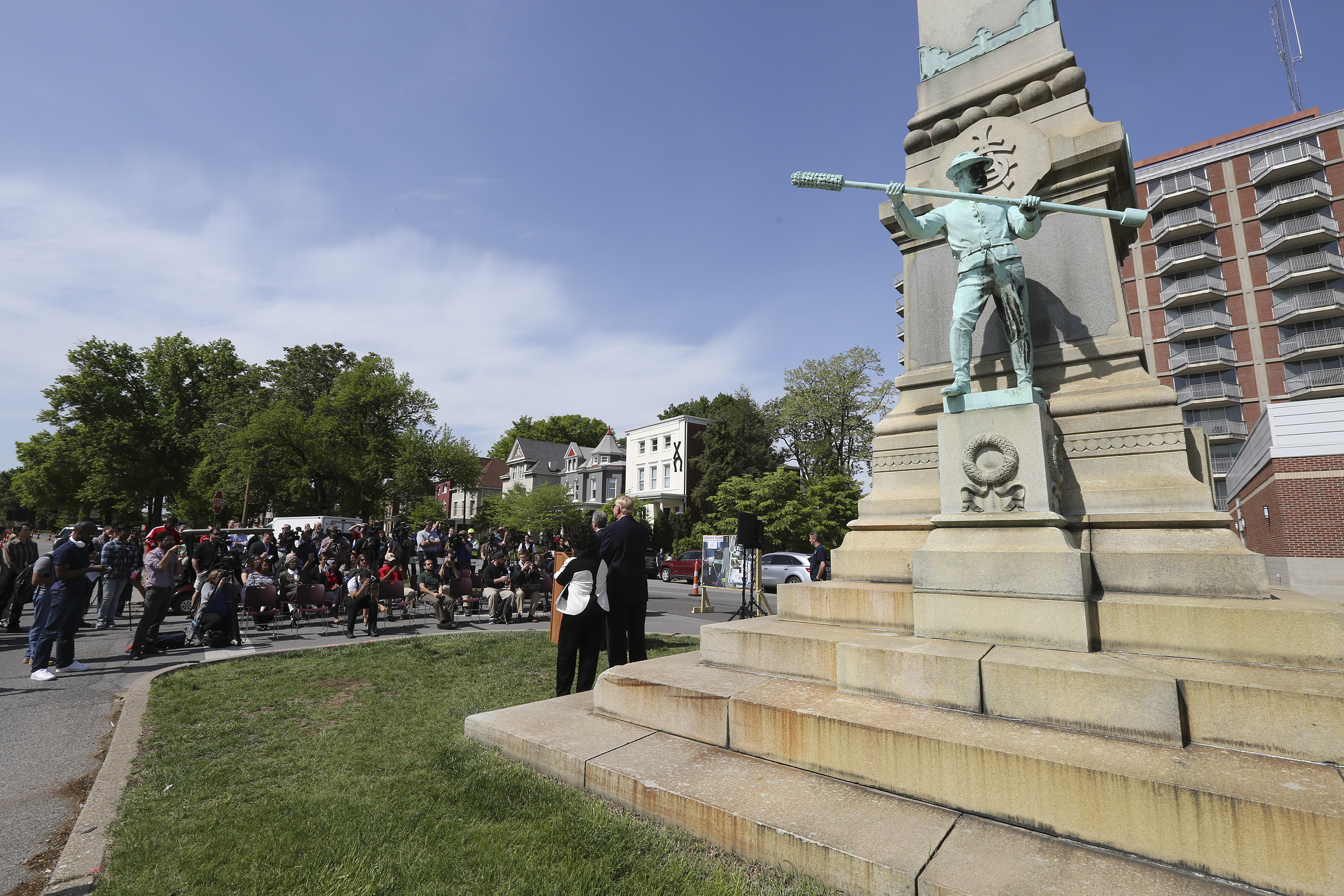![Confederate statue to be removed at U of L [video : 83713636]](http://download.gannett.edgesuite.net/courierjournal/brightcove/29913742001/201604/1957/29913742001_4870745897001_video-still-for-video-4870648516001.jpg?pubId=29913742001)
![635975295909920928-ConfederateMonument18.jpg [image : 83703074]](http://www.gannett-cdn.com/-mm-/06f652dd16c926e76b32b6efbb0e253eb14dc92e/c=330-0-2670-2000/local/-/media/2016/04/29/Louisville/Louisville/635975295909920928-ConfederateMonument18.jpg)
A Kentucky judge on Monday issued a restraining order to block removal of a controversial Confederate monument in Louisville.
Jefferson County Circuit Judge Judith McDonald-Burkman issued the order Monday morning against Louisville Mayor Greg Fischer and Metro Government, barring them from moving or tampering with the 70-foot-tall Confederate monument near the University of Louisville.
A hearing is set for Thursday at 10:30 a.m. to consider the plaintiff's motion for a full temporary injunction.
"The Court finds that the plaintiffs will suffer immediate and irreparable harm if, during the pendency of this litigation, Defendants are allowed to continue with their stated plan to dismantle and remove the Confederate Monument from its present location," the judge wrote.
Republican candidate for Congress Everett Corley filed a temporary restraining order in Jefferson Circuit Court to stop Fischer and University of Louisville President James Ramsey from removing the monument from the school's campus.
Also listed as plaintiffs in lawsuit are the Sons of Confederate Veterans, Kentucky Division, and its "Chief of Heritage Defense," and political activist Ed Springston.
"This restraining order is about respecting veterans," said Corley, a real estate agent, who argued it was the "equivalent of a book burning" and smacked of political correctness gone awry.
![Video | Removal of Confederate monument at U of L blocked [video : 83826396]](http://download.gannett.edgesuite.net/courierjournal/brightcove/29913742001/201605/1275/29913742001_4874624696001_4874620673001-vs.jpg?pubId=29913742001)
Jefferson County Attorney Mike O'Connell said he would fight the restraining order, which he said took him by surprise. He said no one from his office was at the hearing.
"We'll obviously comply with whatever those orders are...but we will move to immediately set this aside," he said. "This is a question of law and a question of facts. I'm not over here to politically grandstand like this gentleman is," he said, referring to Corley.
Thomas McAdam, an attorney for the plaintiffs, said the suit is based on several arguments in hopes of turning the order into a permanent injunction to save the statue.
He said the basis of the lawsuit is that the mayor violated several laws including not going through proper local, state and federal laws including historic preservation procedures.
Because of its placement on the national register of historic places, he said, notifications and hearings are required. The suit argues the move is also a violation of the Kentucky Military Heritage Act and other state laws.
"We expect our elected officials to follow the law. The mayor has not followed the law," he said.
"All we want is a fair hearing, all we want is to let the people know that this is part of our heritage, and you can't just erase history by tearing down monuments .That's what the Taliban does, that's what ISIS does. We don't do that in America."
![Confederate memorial at Ky. university to be removed [oembed : 83747392] [oembed : 83747392] [oembed : 83747392] [oembed : 83747392]](/Portals/_default/Skins/PrestoLegacy/CommonCss/images/smartembed.png)
Reacting to the judge’s decision, Fischer said the county attorney will handle the matter in the courts.
“We believe we made the right decision,” Fischer, the mayor, said.
Fischer has previously said it should be moved because it represents a painful chapter in history and no longer has a place in Louisville.
Asked if his administration followed proper procedure to move the memorial honoring Confederate soldiers, Mayor Greg Fischer there is no such process on the books. The mayor said it was “kind of a unique situation” and reiterated the monument is not being destroyed but relocated to a more appropriate spot.
“We wanted to make sure that the state, the university and city were lined up on it and decided to make the decision,” Fischer said. “We feel good about that.”
The granite monument, completed in 1895, was built with funding from the Kentucky Women's Confederate Monument Association for $12,000, according to the suit, and is now located between Second and Third streets.
Opponents have said the mayor’s announcement is tantamount to erasing history and ignores how Confederate soldiers played a role in the city’s history.
“We need to understand our history in order to recognize and counteract its lingering effect,” Martina Kunnecke, president of Neighborhood Planning & Preservation said Sunday. “Erasing it only serves to sanitize what was and what is.”
The restraining order comes on the same day Fischer announced the formation of a historic preservation task force that the mayor’s office says will seek ways to honor Louisville’s heritage.
![5 things to know about Ky.'s Confederate monument [oembed : 83747376] [oembed : 83747376] [oembed : 83747376] [oembed : 83747376]](/Portals/_default/Skins/PrestoLegacy/CommonCss/images/smartembed.png)
Keith Runyon, co-chair of the mayor’s panel, said Monday that unlike historic markers that remind residents about the horrors of the past, the Confederate memorial is one that honors those who wanted to maintain slavery.
“The old South, and the antebellum shtick that Louisville has sometimes attached to is not constructive,” he said.
“This is a dynamic monument, a ‘we’ll rise again’ sort of thing,” he added. “And just over time some things become outdated, and I think this one is.”
Kunnecke’s group has asked the Kentucky Heritage Council if removing the memorial falls under their purview. The group also wants to know what, if any, process is required to move or remove a historic monument.
“If you bleach away the complexity of our common past, it is difficult to perceive how complicated and horrible things were and remain,” Kunnecke said.
“We never develop the discernment to recognize the inconsistencies or injustices that persist right under our very noses.”
![Confederate flag controversy simmers on in Congress [oembed : 83746538] [oembed : 83746538] [oembed : 83746538] [oembed : 83746538]](/Portals/_default/Skins/PrestoLegacy/CommonCss/images/smartembed.png)


